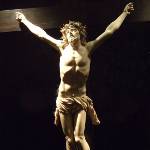Good Friday in Eastern Christianity Date in the current year: April 10, 2026
 Good Friday, also known as Great Friday and Holy Friday, is a Christian feast that commemorates the crucifixion of Jesus Christ and his death at Golgotha. It is celebrated on the Friday preceding Easter by all Christian denominations.
Good Friday, also known as Great Friday and Holy Friday, is a Christian feast that commemorates the crucifixion of Jesus Christ and his death at Golgotha. It is celebrated on the Friday preceding Easter by all Christian denominations.According to the four canonical Gospels, Jesus was arrested in the Gardens of Gethsemane after the Last Supper with the Apostles, condemned for blasphemy, and concurred with a death sentence. He was crucified alongside two criminals at the place called Golgotha in Hebrew or Calvary in Latin.
Jesus agonized on the cross for six hours. It is said in the Gospels (except for the Gospel of John) that during his last three hours on the cross, darkness fell over the whole land. When Jesus died, his body was taken by Joseph of Arimathea who placed it in his own new tomb. The proper burial ceremony, however, was postponed until Sunday since it couldn’t be held on the Sabbath day.
In Eastern Christianity, Good Friday is known as Great Friday or Great and Holy Friday. The holiday is sometimes also called Passion Friday, referring to the Passion of Christ. It is observed with strict fasting. The faithful are expected to abstain from all food and drink the entire day, unless there are health issues that may prevent them from doing so.
On this day, the clergy wear black vestments instead of the purple or red that are customary throughout the Great Lent. There is no “stripping of the altar” on the day before as in Western Churches; instead, all of the antepedia (church hangings) are changed to black.
The Divine Liturgy is never celebrated on Holy Friday since the day commemorates the sacrifice Jesus made through his crucifixion. The only exception is when Holy Friday coincides with the feast of Annunciation, which is celebrated by most Eastern churches on April 7 in the Gregorian calendar. The liturgy of the day usually includes the Matins of the Twelve Passion Gospels on Thursday night, the Royal Hours, the Vespers of the Taking-Down from the Cross, and the Lamentation at the Tomb.
In the Slavic countries, there are folk customs and superstitions associated with Good Friday. Most of them stem from the solemn nature of the holiday. For example, many people believe that one mustn’t laugh during the day, otherwise he or she will be sad for the entire year. Having cleaned the house on Maundy Thursday, one mustn’t perform any household chores on Good Friday, including house cleaning, laundry, sewing, or working in the garden.
Peasants used to believe that bread baked on Good Friday doesn’t get moldy, can cure illnesses, and protects from evil. In some localities, hot cross buns baked on this day were used as talismans against house fires.
Orthodox Good Friday is a public holiday in some countries, including Bosnia and Herzegovina, Bulgaria, Cyprus, Eritrea, Ethiopia, Georgia, Greece, Lebanon, Montenegro, Romania, Serbia, and Sudan. However, there are countries with a predominantly Orthodox population where Good Friday is a regular working day; they include Albania, Moldova, Russia, Ukraine, and some others.
- Category
- Religious Holidays
- Country
- Bosnia and Herzegovina, Bulgaria, Cyprus, Georgia, Greece, Lebanon, Romania, Montenegro, Serbia, Sudan, Eritrea, Ethiopia
- Tags
- Good Friday in Eastern Christianity, Great Friday, Holy Friday, religious holiday, crucifixion of Jesus